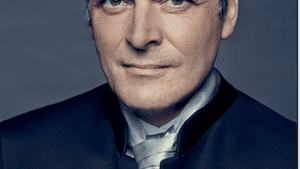Stay in the Loop
BSR publishes on a weekly schedule, with an email newsletter every Wednesday and Thursday morning. There’s no paywall, and subscribing is always free.
Rich Chopin, playful 'Petrushka'
Week two of the Philadelphia Orchestra's Paris Festival (first review)

Yannick Nézet-Séguin is a bit of a trickster. For the second concert in this month’s Paris Festival series, he led the Philadelphia Orchestra in an encore. But rather than offer it at the end, he slipped it, with a wink, into the beginning of the program. In this case, it was the only truly French work on the program: Lili Boulanger’s Of a Spring Morning, a lilting tone poem comparable in quality to the best short works of early-20th-century Impressionism. The work slips effortlessly from lush, swelling phrases to chirping woodwinds and bold assertions. Sheer loveliness.
The kid sister of Aaron Copland’s music teacher, Nadia Boulanger, Lili Boulanger was the first woman to win the Prix de Rome in musical composition. Tragically, her life was cut short by consumption (what we now call tuberculosis) when she was only 24. And consumption brings us to the next composer featured in this concert, and its first scheduled work: The first piano concerto by Frederick Chopin. Chopin was only 20—more than halfway through his own short life—when he composed this engaging work in E minor, the last work that he premiered in his native Poland.
Perfect pairing
The soloist for this performance was French-Canadian pianist Louis Lortie. I last heard Lortie with the Wiener Symphoniker in Vienna’s Konzerthaus in October 2015, with Simone Young conducting. At that time, he performed Schubert’s Wanderer Fantasy with intelligence, poise, and maturity, but it was in the encore, one of Liszt’s Consolations, that his playing opened up, revealing new ranges of creativity and imagination. It is not surprising that a pianist is more fluid when performing solo, freed from the constraints of the surrounding orchestra.
Happily, the Chopin concerto offered abundant opportunities for solo and ensemble playing. From the first notes, Lortie’s touch merged warmly with the orchestra’s rich, romantic sound, led by Nézet-Séguin at just the right tempo and feeling, shorn of sappiness. This concerto is filled with wistful melodies, seeming to yearn for long-gone times, and listeners may feel free to sink into a mood of nostalgia and regret (I certainly did, having just listened to the presidential swearing-in ceremony).
The concerto offers many escape routes for the pianist, a songbird caged within the unyielding architecture of the score, to break free and sing in his own unique voice. Lortie takes flight, never surrendering the discipline of his impeccable technique. Some crisp high notes and velvety undertones unique to Lortie’s style seemed to enlarge the sound and scope of this work, and in a good way.
After a reflective Larghetto, the third movement sprang to life with a stately Polish dance (a Krakowiak in double time). Lortie continued throughout this movement to play with power and sensitivity, and seemed to enjoy himself immensely in the process. After several curtain calls, he performed Chopin’s “Aeolian Harp” Etude Op. 25, No. 1, just about as beautifully as I have ever heard it, catching some audience members off guard with that puckish little curlicue at the end
Puppetry in motion
The large work on the program was Stravinsky’s Petrushka, the symphonic edition of the Diaghilev ballet about the adventures of three puppets. Nézet-Séguin conducted the 1947 version, consisting of four tableaux with slightly downsized orchestral forces (but still a large ensemble with plenty of clangy percussives to replicate a carnival atmosphere). Despite the separate narratives of the tableaux, the work has a solid, unified feel to it, at times funny and whimsical, occasionally sinister, and from time to time very soft with little bright bits of trumpet tagged on, like gold leaf on a Klimt portrait.
Excellent solo passages were provided by Jeff Khaner on flute, Dave Bilger on trumpet, and Ricardo Morales on clarinet, with additional first-rate playing by associate chairs; such energy, like so many bees creating a comb of smooth honey. The work ends with a whisper and a sweet goodnight.
To read Steve Cohen's review, click here.
To read Steve Cohen's review of week one of the Philadelphia Orchestra's Paris Festival, click here.
What, When, Where
Paris Festival: Week Two. Yannick Nézet-Séguin, conductor. Louis Lortie, piano. Boulanger, L., Of a Spring Morning; Chopin, Piano Concerto No. 1 in E minor, Op. 11; Stravinsky, Petrushka (1947 version). January 19-21, 2017, at the Kimmel Center's Verizon Hall, 300 S. Broad Street, Philadelphia. (215) 893-1999 or philorch.org.
Sign up for our newsletter
All of the week's new articles, all in one place. Sign up for the free weekly BSR newsletters, and don't miss a conversation.

 Linda Holt
Linda Holt